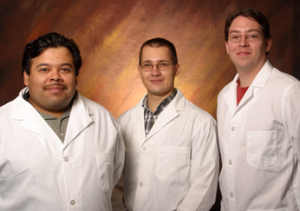College of Engineering Graduate Students to Research Nanomagnetics in Naval Research and Development Centers
Projects including the detection of biological agents, development of new techniques used to uncover land mines and the progression of computer memory to withstand volatile environments are among the research and development endeavors that select University of Houston Cullen College of Engineering graduate students will be involved in while participating in the National Science Foundation (NSF)-Navy Civilian Service Fellowship Program.
The Nanoscale Interdisciplinary Research Team at the Cullen College of Engineering recently collaborated with the U.S. Naval Research Laboratory and the Naval Air Warfare Center Weapons Division (NAWCWD), through a NSF grant, to provide opportunities for a group of graduate students in the Electrical and Computer Engineering Department to participate in joint research programs to study and develop technologies in the area of nanomagnetics. Graduate students Barry Craver, Ariel Ruiz and Darren Smith were selected so far by the department as participants for the prestigious program. These students will pursue research at UH during the academic year, while interning throughout the summer at the U.S. Naval Research Laboratory in Washington, D.C., or NAWCWD, located in China Lake, CA.
“Not only is this a great opportunity for the students, who may potentially receive job offers from these labs, but the collaboration allows the college and university to work closely with Navy research and development centers,” said Dmitri Litvinov, associate professor of electrical and computer engineering and principal investigator for the project.
Litvinov, along with Professor Jack Wolfe, pursued the program offered by NSF in an effort to expand collaborative research ventures with the U.S. Naval Research Laboratory, one of the top research organizations in the nation. Both professors conduct research for the UH Center for Nanomagnetic Systems as part of the Nanoscale Interdisciplinary Research Team.
“We’ve placed three highly qualified students in the program who specialize in the designated research areas so far,” said Litvinov. “The prestige of this program will help us with our recruitment efforts.”
The NSF grant totaling over $226,000 in direct costs will support the fellowship and tuition-related costs for the students. The research will focus on the development of device structures, including nanomagnetic biosensors, magnetic random access memory (MRAM), and ultra-sensitive magnetic sensors for detection of landmines. The U.S. Naval Research Laboratory is interested in the development on the nanomagnetic biosensors, which can be utilized for detection of biological warfare agents (such as anthrax) as well as for civilian applications such as food and water safety monitoring. The lab is also interested to the development of low power non-volatile computer memory that can withstand the effects of ionizing radiation and severe electromagnetic pulses, the by-products of nuclear explosion. The third project, in collaboration with NAWCWD, will focus on the development of a new high-sensitivity technique to improve land mine detection for U.S. military personnel while on foreign land.
“The opportunity to work in collaboration with the naval laboratories is substantial,” said Raymond Flumerfelt, dean of the Cullen College of Engineering. “The students and faculty members will benefit greatly from these joint research endeavors and play a significant role in developing technology that will ultimately have great impact.”
In addition to the research and educational benefits such a program provides participants, the Navy has scheduled two NSF-Navy Civilian Service Leadership symposia a year to help students with professional development. A mentor will be working with students throughout their internships at one of the Navy sites as part of this professional development program.
